|
|
|
Sort Order |
|
|
|
Items / Page
|
|
|
|
|
|
|
| Srl | Item |
| 1 |
ID:
101385
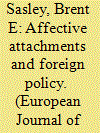

|
|
|
|
|
| Publication |
2010.
|
| Summary/Abstract |
Although the important role of emotions in decision-making has been highlighted in the psychology, neural science, and decision research literatures, this conclusion has not been widely adopted in foreign policy analysis and International Relations (IR). Of the work that has been done, much of it has been focused on public perceptions and the impact on foreign policy, but not on elites and the actual decisions of foreign policy. This article seeks to address this imbalance by examining the role of one element of emotion - affect - on key foreign policy decision-makers. It argues that the greater the emotional attachment a leader has to an object, the less flexible she is in foreign policy toward that object. The model is used to explain a critical puzzle in IR: Israel's decision to pursue and sign the 1993 Oslo Accords.
|
|
|
|
|
|
|
|
|
|
|
|
|
|
|
|
| 2 |
ID:
101380
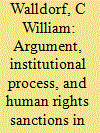

|
|
|
|
|
| Publication |
2010.
|
| Summary/Abstract |
When do humanitarian norms lead great powers, especially democracies, to impose sanctions against strategic partners and allies? I argue that answering more specific questions like this in space and time requires constructivists to focus greater attention on institutional and ideational process. Agents are central to policy change. But the ideational and institutional context in which agents build arguments determines when this change is more or less likely. In this vein, I argue that three factors in liberal states - legislatures, the nature of activist pressure, and strategic ideas - explain when humanitarian norms produce sanctions. I demonstrate the argument through a study of US Cold War relations with South Africa, Turkey, and Greece. Among other contributions, this article demonstrates how attention to process can extend the constructivist agenda into a series of new empirical domains and open avenues for contributions to important policy debates.
|
|
|
|
|
|
|
|
|
|
|
|
|
|
|
|
| 3 |
ID:
101377
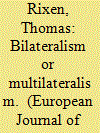

|
|
|
|
|
| Publication |
2010.
|
| Summary/Abstract |
Why do states cooperate bilaterally or multilaterally? This article addresses the issue using the example of international double tax avoidance. It is argued that double tax avoidance exhibits the strategic structure of a coordination game with a distributive conflict. The distribution of tax revenues depends on the asymmetry of investment flows between treaty partners. Since investment flows are defined dyadically, bilateral bargaining can best accommodate countries' concerns for the distribution of tax revenues and other economic benefits connected to the tax base. Moreover, because there are no serious externality problems with bilateral agreement, this solution is also viable. At the same time, there is a need for a multilateral organization to disseminate information and shared practices in the form of a model convention that provides a focal point for bilateral negotiations. This solution minimizes transaction costs. Since agreements are self-enforcing in coordination games there is no need for third-party enforcement. Instead, the Mutual Agreement Procedure (MAP) is a device to address problems of incomplete contracting.
|
|
|
|
|
|
|
|
|
|
|
|
|
|
|
|
| 4 |
ID:
101376
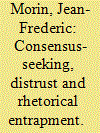

|
|
|
|
|
| Publication |
2010.
|
| Summary/Abstract |
While the WTO secretariat, key delegations, several NGOs, and industry publicly present the 30 August 2003 WTO Decision as an attempt to reconcile intellectual property with access to medicines, our research shows otherwise. We draw on qualitative analyses of 54 interviews and a lexicometric analysis of press releases to show that their enthusiastic public statements contrast deeply with their internal, cynical beliefs. Most of these actors not only consider the WTO Decision to be fundamentally flawed but claim to have known this prior to its adoption. We argue that a procedural norm of consensus-seeking impeded traditional bargaining over this sensitive issue and that distrust among participants hindered truth-seeking deliberation. Caught between strategic and communicative actions, state and non-state actors found themselves trapped in their own rhetoric of reconciling intellectual property with access to medicines. They realized that the appearance of a solution, rather than a functional solution, provided the only realistic outcome to a fruitless and publicly damaging continuation of debate. From a theoretical perspective, this case study sheds a new light on the gray zone between rational choice theory and constructivism, where both discourse and strategies matter. From an empirical perspective, it illustrates the risk of seeking consensus within international regimes when the procedural norm of consensus coexists with a high level of distrust.
|
|
|
|
|
|
|
|
|
|
|
|
|
|
|
|
| 5 |
ID:
101387
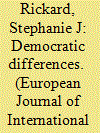

|
|
|
|
|
| Publication |
2010.
|
| Summary/Abstract |
A growing body of literature argues that democracies are more likely to comply with international agreements than authoritarian states. However, substantial variation exists in the compliance behaviour of democracies. How can this variation be explained? The same mechanism that links regime type to compliance, namely electoral competition, also explains variation in compliance among democracies. This is because the nature of electoral competition varies across democratic systems. An analysis of democratic GATT/WTO member countries from 1980 to 2003 reveals that governments elected via majoritarian electoral rules and/or single-member districts are more likely to violate GATT/WTO agreements than those elected via proportional electoral rules and/or multi-member districts.
|
|
|
|
|
|
|
|
|
|
|
|
|
|
|
|
| 6 |
ID:
101379
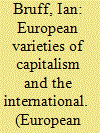

|
|
|
|
|
| Publication |
2010.
|
| Summary/Abstract |
This article develops a framework for analysing the distinctive national trajectories of European varieties of capitalism under the conditioning of 'the international'. It does so through a critical engagement with two prominent historical materialist literatures - transnational historical materialism and uneven and combined development. I argue that, in contrast to these contributions, a nationally-oriented perspective utilizing Antonio Gramsci's writings on 'common sense' has greater potential for narrowing the optic from broader concerns to fine-grained analysis. In particular, I focus on how articulations between the national and the international are constitutive of how humans make sense of the material basis for their existence.The Dutch variety of capitalism is then examined in order to demonstrate the advantages of utilizing this 'common sense' framework for political economy analysis.
|
|
|
|
|
|
|
|
|
|
|
|
|
|
|
|
| 7 |
ID:
101367
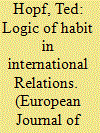

|
|
|
|
|
| Publication |
2010.
|
| Summary/Abstract |
IR theory is dominated by the logics of consequentialism and appropriateness. But Max Weber offered four logics of choice, not just two. Beyond the instrumental rationality of Zweckrationalität and the normative rationality of Wertrationalität are affect and habit. Drawing on Weber, James, Dewey, and Bourdieu, and habit's microfoundations in neurocognitive psychology, I explore the logic of habit and its consequences for several fundamental puzzles in IR theory. The logic of habit necessarily precludes rationality, agency, and uncertainty, and so offers a different interpretation of cooperation, security dilemmas, enduring rivalries, and security communities in international politics. The logic of habit also fills a gap in mainstream constructivism's theorization of intersubjective structures, returning the taken-for-granted lifeworld to the center of attention.
|
|
|
|
|
|
|
|
|
|
|
|
|
|
|
|
| 8 |
ID:
101374
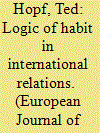

|
|
|
|
|
| Publication |
2010.
|
| Summary/Abstract |
IR theory is dominated by the logics of consequentialism and appropriateness. But Max Weber offered four logics of choice, not just two. Beyond the instrumental rationality of Zweckrationalität and the normative rationality of Wertrationalität are affect and habit. Drawing on Weber, James, Dewey, and Bourdieu, and habit's microfoundations in neurocognitive psychology, I explore the logic of habit and its consequences for several fundamental puzzles in IR theory. The logic of habit necessarily precludes rationality, agency, and uncertainty, and so offers a different interpretation of cooperation, security dilemmas, enduring rivalries, and security communities in international politics. The logic of habit also fills a gap in mainstream constructivism's theorization of intersubjective structures, returning the taken-for-granted lifeworld to the center of attention.
|
|
|
|
|
|
|
|
|
|
|
|
|
|
|
|
| 9 |
ID:
101383


|
|
|
|
|
| Publication |
2010.
|
| Summary/Abstract |
In an attempt to broaden our perspective on IR theory formation, this article seeks to highlight the significance of ideology. Consistent with the recently revived sociology of knowledge tradition in international studies, we view IR scholarship as grounded in certain social and ideological conditions. Although some scholars have studied the political, ideological, and epistemological biases of Western, particularly American, civilization, in order to achieve a better understanding of global patterns of knowledge formation it is important to look at cases beyond the West. We therefore look at the formation of IR knowledge in Russia, and we argue that the development of a Russian theory of international relations responds to the old debate on the 'Russian idea,' and three distinct ideological traditions that had been introduced to the national discourse in the mid-19th century. Focusing on theories and concepts of the international system, regional order, and foreign policy, as developed by Russian scholars, we attempt to demonstrate how they are shaped by ideological and therefore pre-theoretical assumptions about social reality.
|
|
|
|
|
|
|
|
|
|
|
|
|
|
|
|
| 10 |
ID:
101389


|
|
|
|
|
| Publication |
2010.
|
| Summary/Abstract |
In this article we propose a framework for understanding order within Regional Security Complexes (RSCs), focused upon the importance of regional powers. We argue that there are three factors to consider in adequately explaining regional security with respect to the influence of regional powers: structure, regional power roles, and regional power orientations. The first factor emphasizes the necessary but not sufficient attributes of power and capability for understanding regional security dynamics. The last two factors stress the importance of regional power behavior as being critical to the security process. To this end we highlight three specific roles and sets of orientations that when examined in the context of structural factors, provide a clearer picture of security orders in RSCs.
|
|
|
|
|
|
|
|
|
|
|
|
|
|
|
|
|
|
|
|
|